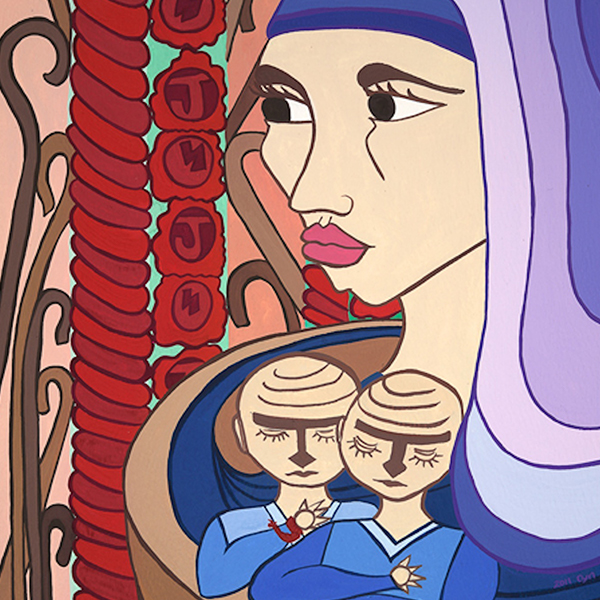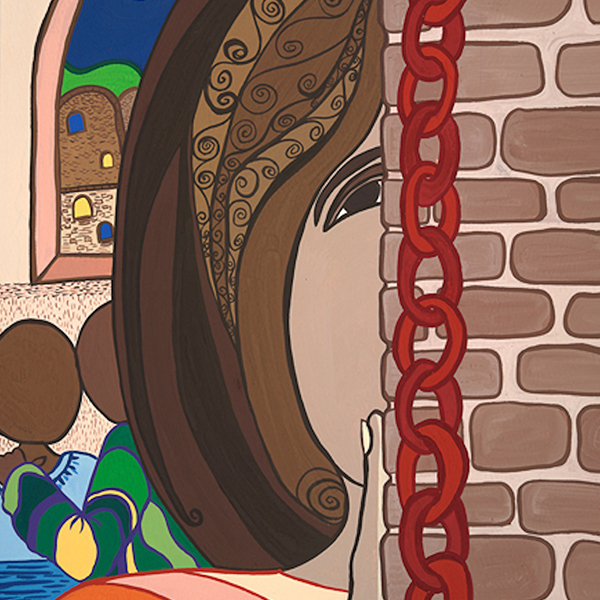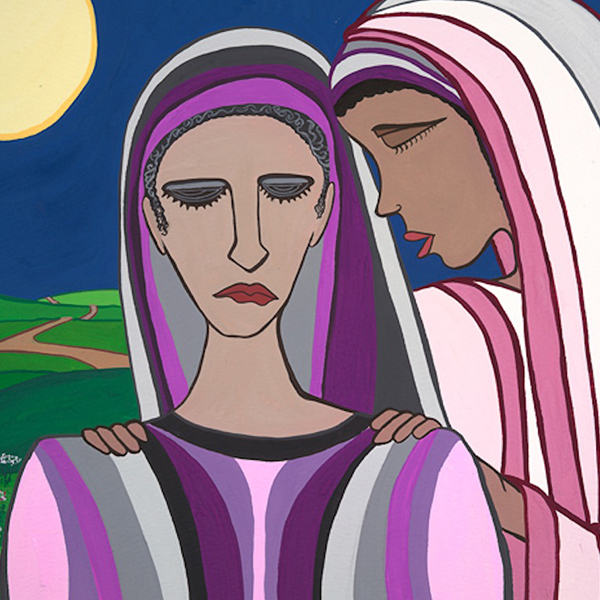Blessed Because of Her Son & Savior
 The last out-of-place-ornament on Jesus’ family tree, his mother, Mary, is probably the most familiar woman in his lineage. However, unlike the others who had pasts as prostitutes, widows, and foreigners, we don’t know much about Mary’s background.
The last out-of-place-ornament on Jesus’ family tree, his mother, Mary, is probably the most familiar woman in his lineage. However, unlike the others who had pasts as prostitutes, widows, and foreigners, we don’t know much about Mary’s background.
We first meet her when the angel Gabriel appeared to share the wonderful, yet terrifying, news that she, a virgin, would have a baby who will be the Savior of the world. With just a few bumps along the way, the next nine months passed quickly.
Mary’s betrothed, Joseph, understood that this child was from God; he had planned to divorce her quietly. After an angelic intervention, Joseph took Mary home to be his wife. Perhaps to avoid the rumors that would have spread about her during her pregnancy, Mary spent time with her, also expecting a baby, cousin, Elizabeth.
The next thing we know, Mary and Joseph are in Bethlehem. They traveled there for Caesar’s census, and while they were there, the time came for her baby to be born, and Mary gave birth to her firstborn, a son, and she named him “Jesus.” And Mary had much to ponder in her heart. Her questions about everything that had happened were, I imagine, much like ours.
Why Mary?
How did she get here? Why was SHE the one holding the Savior of the Nations in her humble hands? She was not wealthy or famous or mature. She was a teenager and about as low on the social ladder as one could get. She lived in the out-of-the-way town of Nazareth of all places.
In the eyes of the world, nothing made her qualified for a task and privilege so special. So why did God choose Mary to be the mother of Jesus? Why did God choose insignificant Mary to be the wrapping paper for the most fantastic present ever given or known to humanity?
When someone receives a vital task or position, they usually have the proper qualifications. When a promotion or exclusive assignment is up for grabs in the business world, the privilege usually goes to those who have shown special abilities in a particular area of expertise. The same is true in other areas of life.
But from what we know about her, Mary did not have any superior talents as a mother or any specific religious training that made her better prepared to raise and train Jesus than any other young maiden. So, what made Mary worthy of being the chosen mother of the Holy One, Jesus?
She Must Have Done Something
Mary was not a princess or from the great religious families of the day. She was not even an experienced mother. So, there must have been something else that made God choose her to be the mother of the Son of God, right? But what could it be?
Was it because she was holier than other women? Was it because of her unparalleled grace and virtue, as many have concluded? Was it because she was somehow sinless and entirely in line with God’s will and therefore deserving to be the mother of God?
Many throughout the ages have concluded that these must be the reasons. They say the reason God chose her was her complete adherence to the Father’s will and because of the contributions she would make to her Son’s work of redeeming the world.
In Her Own Words
Mary herself, however, would say otherwise. In her own words, often referred to as The Song of Mary, Mary helps us understand God’s plan for her and her baby and why he chose someone like her.
And Mary said, My soul doth magnify the Lord, And my spirit hath rejoiced in God my Saviour. For he hath regarded the low estate of his handmaiden: for, behold, from henceforth all generations shall call me blessed. For he that is mighty hath done to me great things; and holy is his name. And his mercy is on them that fear him from generation to generation. He hath shewed strength with his arm; he hath scattered the proud in the imagination of their hearts. He hath put down the mighty from their seats, and exalted them of low degree. He hath filled the hungry with good things; and the rich he hath sent empty away. He hath helped his servant Israel, in remembrance of his mercy; As he spake to our fathers, to Abraham, and to his seed for ever.
Luke 1:46-55
I have always thought that those were some pretty impressive words, but for years every time I heard or read The Song of Mary, I missed something important Mary said—three little words—“God my Savior.”
My Son, My Savior
Here, Mary says that she, like all of humanity, needed a Savior. Although she was the mother of Christ, she too needed rescuing. Like Tamar, Rahab, Ruth, and Bathsheba before her, Mary was a sinner. Mary didn’t have “prostitute” or “adulterer” attached to her name, but she was far from blameless. She had not come into the world like her son by “immaculate conception.” Instead, she came from two sinful parents, and as a sinner, Mary herself, like every other human being, had committed countless sins. Though Mary knew she was not “blameless,” she knew she could and would be called “blessed.”
All Will Call Me Blessed
Mary looked to the Lord God and this baby as her Savior from sin, from the curse of the law, death, and eternal punishment. When Mary first applied this good news to herself, Mary rightly assumed that “all generations shall call [her] blessed.” But why exactly did Mary consider herself blessed?
As the angel Gabriel and Elizabeth had proclaimed, Mary was worthy of being called “blessed” because God was with her, and she believed in God and his words to her.
Mary understood that she would not be “blessed” because of any holy qualities found within her. She was worthy of being “blessed” because of and by the baby she bore. God blessed Mary by lifting her from her lowliness for his glory and her good.
Lifting the Lowly
When Mary said, “For he that is mighty hath done to me great things; and holy is his name,” do you think that perhaps she said this to show that God, not she, is holy? Maybe Mary foresaw that people would misunderstand her role in this miraculous birth.
Mary tells us the real reason why God would choose her when she said of this Mighty Holy God, “He hath put down the mighty from their seats, and exalted them of low degree. He hath filled the hungry with good things; and the rich he hath sent empty away. He hath helped his servant Israel, in remembrance of his mercy; As he spake to our fathers.”
Mary understood how God worked in the past through the humble and the lowly to carry out his salvation plan. Mary, a believer, must have remembered how God had worked through men of low status like Moses, Gideon, and David to carry out his plans for the salvation and preservation of his people.
- God used Moses, a son of slaves and a wandering shepherd, to lead his people out of slavery in Egypt and towards the Promised Land.
- God used Gideon, the youngest son of the lowliest family in Israel’s lowliest tribe, to be his leader against the invading Midianite army.
- God used David, the youngest of many brothers, a boy who had the job of watching sheep, to be the slayer of the giant Goliath and the greatest king of Israel.
Not Holier Than Thou
These men were not somehow holier or more blessed because of anything they were or did. Like Mary, they were blessed because God was with them and allowed them to be privileged to be part of his mighty saving work. As Martin Luther paraphrased, Mary understood well the reason why God chose her:
God has regarded me, a poor, despised, and lowly maiden, though he might have found a rich, renowned, noble, and mighty queen, the daughter of princes and great lords. He might have found the daughter of Annas or of Caiaphas the high priests, who held the highest position in the land. But he let his pure and gracious eyes light on me and used so poor and despised a maiden, in order that no one might glory in my presence, as though I were worthy of this, and that I must acknowledge it all to be pure grace and goodness and not at all my merit or worthiness.
Martin Luther, “The Magnificat,” Luther’s Works (LW), American Edition, Vol. 21 (St. Louis: Concordia Publishing House, 1956), p. 314.
God chose someone of low and humble status like Mary so that the world would focus not on her but the child in her womb. The Song of Mary is not a song about Mary; it’s a song about her son, her Savior, and the Savior of the world. It’s a song about his love for us—all of us.
Mercy from Generation to Generation
There are some remarkable parallels here, aren’t there? Think of Mary and her place in the Savior’s story and his family. Now think of us.
Are we any less common folk than Mary? How many of us are high-born? I’m not. I didn’t grow up in a palace. I don’t have royal blood coursing through my veins? Do you?
How many of us have made a name for ourselves? How many of us will find our way into history books after our time on earth is over? Nevertheless, God has also been mindful of our “low estate.”
And so, we are confronted with the same question Mary invariably wondered about, “Why? Why should we be so blessed? Why have we, too, been chosen for the privilege of knowing and bearing Christ?
We find the answer in a single word. A single word, the depths of which can never be fully discovered by mere mortals, that word is “mercy.” Mary said, “And his MERCY is on them that fear him from generation to generation.”
Like with Mary, God has shown mercy to those who fear him, on those who put their trust in him, from one generation to the next. We still today are a part of the ages upon whom God has extended his mercy and performed his mighty deeds.
Filled with Good Things
Mary’s message focuses us on the mercy and greatness of what God has done for us on that very first Christmas. On that day and from it, “He has performed mighty deeds with his arm; he has scattered those who are proud in their inmost thoughts. He has brought down rulers from their thrones but has lifted up the humble. He has filled the hungry with good things but has sent the rich away empty.”
Here, Mary compares and contrasts God’s merciful blessings upon those who trust in him with the judgment that falls upon those who do not trust in him. In God’s economy, there is a decidedly different understanding of “haves” and “have-nots.” It all has to do with Christ.
Those who were once spiritually hungry have been “filled with good things” not because they worked for or procured them. God’s “mercy” and distribution of his “good things” are not dependent upon a certain level of performance. Again, it all has to do with Christ. He serves and satisfies. But with what?
The long list includes:
- Himself by becoming Immanuel—“God with Us”
- Forgiveness of the sins, sins, which rightfully ought to condemn us
- The knowledge that, for us, heaven replaces hell
- Comfort in times of trouble
- Confidence in times of uncertainty
- Welcome for former enemies into the family of God
- The right through the work of Christ to return to God’s holy presence
These things fill and satisfy the spiritually hungry. These things constitute real wealth and belong to those who are in Christ Jesus. But how can we be sure that God has “made good” on these “good things?”
The Perfect Promise Keeper
In the final verse of her song, Mary tells us. She expressed joy and gratefulness for God’s faithfulness and the surety of his salvation when she said, “He has helped his servant Israel, remembering to be merciful to Abraham and his descendants forever, even as he said to our fathers.”
Mary knows her family history and knows that when God says he will do something, he will do it.
There are no good but unrealized intentions with God—no dashed hopes or unmet expectations—only kept promises. And what has he promised? A wonderful merciful Savior who was born, lived, died, and rose for Mary, for you, and for me. And someday, he’s coming back to take those who believe in him to be with him always.
How can you be sure you will be with God always? Trust in his promises and recognize, like Mary, your unworthiness, and discover all the blessings found in Mary’s Son, her Savior, and ours too.

Art by Chris Powers
Questions to Consider
- What does Mary's story lead me to confess about myself and my story?
- What does Mary's story teach me about Jesus and my part in his story?
- What does Mary's story and her place in his story lead me to pray about this week?
More Stories from Jesus' Family Tree
Are you anxious?
Free 4-Lesson Scripture Study
We are all carrying something. Weariness from the treadmill of life, isolation and loneliness from feeling like we don’t belong, anxiety over what might happen to us and those we love in the end, bitterness from failing to forgive, or tension from having forgiveness withheld from us.
Our FREE, Handbook for Healing scripture study identifies your pain, shares the cure and provides a treatment plan for living a life of freedom, forgiveness and peace can look like for you.







